Highways in the Czech Republic
Highways in the Czech Republic are managed by the state-owned Road and Motorway Directorate of the Czech Republic – ŘSD ČR, established in 1997. The ŘSD currently (2018) manages and maintains 1,250 km of motorways (dálnice), whose speed limit is of 130 km/h or 80 mph (or 80 km/h or 50 mph within a town). The present-day national motorway network is due to be of about 2,000 km before 2030.[1]
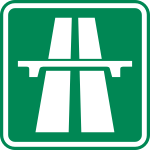

Toll requirements
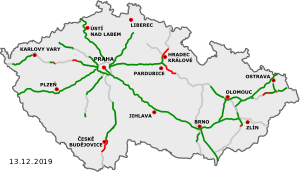
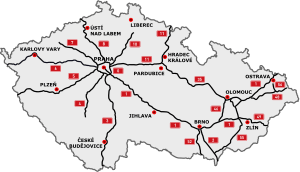
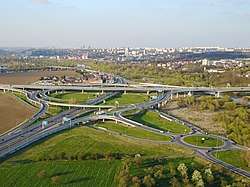
Motorcars up to 3.5 tonnes
In 2018, for motorcars with a maximum authorized mass of up to 3.5 tonnes, motorways in the Czech Republic (with some exceptions, see below) are subject to a time-based fee (časový poplatek) paid with the purchase of a windscreen toll vignette (dálniční známka or dálniční kupón) with a validity of either 10 days (310 CZK), 1 month (440 CZK) or 1 year (valid from 1 December 2017 to 31 January 2019) (1500 CZK).
Generally said, a motorway road sign ![]()
 A road sign informing of the motorway section not subject to vignette (toll label) duty for motorcars ≤ 3.5t (usually placed under the road sign for motorway
A road sign informing of the motorway section not subject to vignette (toll label) duty for motorcars ≤ 3.5t (usually placed under the road sign for motorway
.jpg) A road sign informing of the beginning of the motorway vignette (toll label) duty for cars ≤ 3.5t (usually placed under the road sign for motorway after the end of toll-free section
A road sign informing of the beginning of the motorway vignette (toll label) duty for cars ≤ 3.5t (usually placed under the road sign for motorway after the end of toll-free section
| Motorway route subject to a time-based fee (compulsory toll vignette) | mk
L | |
|---|---|---|
| Modletice (exit 76) – Prague-Slivenec (exit 16) | 3 | |
| Prague-Chodov (exit 2) – Kývalka (exit 182) | 08 | |
| Holubice (exit 210) – Kroměříž-západ (exit 258) | 8 | |
| Kroměříž-východ (exit 260) – Říkovice (exit 272) | 12 | |
| Lipník nad Bečvou (exit 298) – Ostrava-Rudná (exit 354) | 58 | |
| Brno-Chrlice (exit 3) – border with Slovakia (exit 61)
– in the direction from Slovakia subject to a charge since km 55,5 (rest area Lanžhot) |
58 | |
| Mezno (exit 62) – Čekanice (exit 76) | 14 | |
| Měšice (exit 79) – Veselí nad Lužnicí, sever (exit 104) | 5 | |
| Jíloviště (exit 9) – Háje (exit 45) | 36 | |
| Prague-Třebonice (exit 1) – Beroun-východ (exit 14) | 14 | |
| Beroun-západ (exit 22) – Ejpovice (exit 67) | 45 | |
| Sulkov (exit 89) – border with Germany (exit 151)
– in the direction from Germany subject to a charge since km 149,7 (rest area Rozvadov) |
62 | |
| Jeneč (exit 7) – Nové Strašecí (exit 32)
- from Cheb to Karlovy Vary as of 2018 without vignette |
25 | |
| Kněževes (exit 3) – Knovíz (exit 18) | 15 | |
| Zdiby (exit 1) – Řehlovice (exit 65) | 65 | |
| Knínice (exit 80) – border with Germany (exit 92)
– in the direction from Germany subject to a charge since exit 65 Řehlovice |
12 | |
| Stará Boleslav (exit 14) – Bezděčín (exit 39) | 25 | |
| Kosmonosy (exit 46) – Ohrazenice (exit 71) | 25 | |
| Jirny (exit 8) – Hradec Králové-Kukleny (exit 90) | 82 | |
| Sedlice (exit 126) – Opatovice (exit 129) | ||
| Mohelnice-jih (exit 235) – Křelov (exit 261) | 26 | |
| Olomouc-Holice (exit 276) – Lipník nad Bečvou (exit 296) | 20 | |
| Vyškov-východ (exit 1) – Prostějov-jih (exit 21) | 19 | |
| Držovice (exit 26) – Olomouc-Slavonín (exit 39) | 11 | |
| Bělotín (exit 1) – Bělotín-východ (exit 3) | ||
| Frýdek-Místek (exit 47) – Žukov (exit 70) | 19 | |
| Rajhrad (exit 10) – Pohořelice-jih (exit 26) | 13 | |
| Hulín (exit 16) – Otrokovice (exit 32) | 14 | |
| Ostrava-Hrabová, průmyslová zóna (exit 40) – Frýdek-Místek (exit 51) | 12 |
Vehicles over 3.5 tonnes
As of 1 January 2007 a new system of electronic toll aka a distance toll for vehicles with a weight exceeding 12 tons has been introduced for motorways and some roads of the first class (silnice první třídy), totally cca 200 km.[3] As of 1 January 2010, this applies also to vehicles over 3.5 tons. There is an ongoing public discussion on imposition of electronic toll for all cars and vehicles.
 A road sign informing of the beginning of the electronic toll duty for vehicles > 3.5t
A road sign informing of the beginning of the electronic toll duty for vehicles > 3.5t.jpg) A road sign informing of the beginning of both motorway vignette (toll label) and electronic toll duty
A road sign informing of the beginning of both motorway vignette (toll label) and electronic toll duty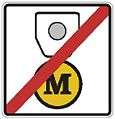 A road sign informing of the motorway section subject to neither motorway vignette (toll label) nor electronic toll duty
A road sign informing of the motorway section subject to neither motorway vignette (toll label) nor electronic toll duty
History of Czech motorways
Before the Second World War
.svg.png)
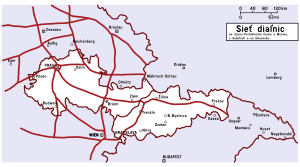
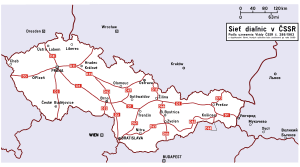
First informal plans of a motorway (called firstly in Czech autostráda or dálková silnice) in Czechoslovakia date back to 1935 and was to link Prague through Slovakia with Czechoslovak easternmost territory of Carpathian Ruthenia (nowadays Zakarpattia Oblast in Ukraine) being Velykyy Bychkiv (Velký Bočkov in Czech) its end on the Czechoslovak - Romanian border. The definitive route, including a Prague ring motorway, was approved shortly after the Munich Agreement on 4 November 1938 for a planned speed limit of 120 km/h.
Nazi authorities also made the second Czecho-Slovak Republic, already a German satellite state, build up a part of the Reichsautobahn Breslau - Vienna as an extraterritorial German motorway with border checkpoints at each motorway exit. However, only a construction of the route within Bohemia and Moravia was initiated, but never finished. It still sporadically appears in some current Czech motorway plans.
On 1 December 1938 the Nazi Germany had already initiated a construction of so-called Sudetenautobahn (in Sudetenland, before the Munich agreement a part of Czechoslovakia, then of Germany) in the route Streitau (Bavaria) – Eger – Carlsbad – Lobositz – Böhmisch Leipa – Reichenberg (capital of Sudetenland) – Görlitz (in Prussia, now in Saxony). The autobahn has never been finished, but some remnants in the landscape close to Pomezí nad Ohří, Cheb/Eger and Liberec/Reichenberg are still prominent and a not finished part from Svárov via Machnín to Chrastava was used in the construction of the road for motorcars I/35.
The Time of the Nazi Occupation
After the breakdown of Czechoslovakia following a declaration of independence of the Slovak Republic and of the short-lived Carpatho-Ukraine which was a prelude to the German occupation of Bohemia and Moravia on 15 March 1939, a decision to build the motorway only to the Slovak border was adopted. The technical parameters of motorways (speed limit of 140 – 160 km/h) were adjusted to those of German Reichsautobahn as Czech (Bohemian-Moravian) motorways should be integrated within the German Reichsautobahn network.
The project for the first segment Prague - Lužná was ready in January 1939, and the construction in Moravia began on 24 January in Chřiby on the Zástřizly - Lužná segment. The construction in Bohemia from Prague on began on 2 May 1939, with switch to right-hand traffic in Bohemia and Moravia already gone without a hitch. The motorway should have reached Brno in 1940, but building materials and labour shortage due to an absolute priority of the nazi armament industry delayed considerably the work. The construction in the route of approx. 77 km from Prague towards Brno advanced notably when a prohibition of all civil constructions by German authorities came into force in 1942.
After the Second World War
After the Second World War, the completion only of the first and unfinished 77 km of the motorway Prague - Brno up to Humpolec was approved by the Government in November 1945 and was reinaugurated in 1946. The construction sites of the partly inaugurated construction of the Sudetenautobahn (28 km) were completely abandoned, as well as that of the Breslau - Vienna motorway (84 km). The latter was, however, incorporated in some plans as a future connection motorway between Brno and the D35 motorway. Just finishing of some large bridges and a concrete surface on the 77 km of the Prague - Humpolec motorway lacked when the new communist government decided to discontinue completely the work in early 1950.
Only on 8 August 1967 the Government of the Socialist Republic of Czechoslovakia resolved to continue the construction of motorways by adopting a new motorway plan for the whole country and passed a resolution of continuation of the already twice interrupted construction of the motorway Prague - Brno (number D1) and further Brno - Bratislava (D2). The construction was solemnly inaugurated on 8 September 1967. Due to a change of technical parameters, some bridges finished before 1950 were replaced. The Prague - Brno motorway (D1), initiated on 2 May 1939, reached Brno in 1980, full 40 years after in the beginning scheduled opening.
The pace of construction of highways has always been rather slow up to the present days. The first 100 km of highways on the territory of today's Czech Republic were completed in 1975, 500 km in 1985 and 1,000 in 2007. Funding for the construction of highways was radically reduced after the crisis in 2008 due to draconian budget cuts and is currently gaining momentum rather slowly for various reasons.
Motorways
.jpg)
The motorways in the Czech Republic, Czech: dálnice (abbr. D), are defined as two-lane motorways in each direction, with an emergency lane. The speed limit is 130 km/h or 80 mph. Their highway shields are white on red and road signs are white on green. As of 1 January 2016, the Czech motorway network comprises 18 motorways. Nowadays, 17 of them are at least partially operational, but only 5 (D2, D5, D8, D10 and D46) have been completed, another one (D1) is near completion by the end of 2022.
The number of a motorway reflects a number of the previous national road alongside which it was built up or which it shall replace. After the construction of the motorway, the affected national road is degraded to a regional road with a number beginning on 6 and having 3 digits. For instance, after the completion of the D8 motorway (Prague - Lovosice), the previous national road no. I/8 between Prague and Lovosice became a regional road no. 608. Regional roads are maintained by the self-governing regions (kraj) and not by the state directly.
| Name of motorway | Motorway route | Operational (km)[4] |
% operational |
In construction (km) |
Planned Total length (km) |
Maximum AADT | |
|---|---|---|---|---|---|---|---|
| D0 | Prague Ring (Pražský okruh) | 41 | 49% | 83 | 75,092 | ||
| D1 | Prague – Jihlava – Brno – Vyškov – Hulín – Přerov – Lipník nad Bečvou – Bělotín – Ostrava – Bohumín – |
366 | 97% | 376 | 99,265 | ||
| D2 | Brno – Břeclav – |
61 | 100% | 61 | 50,905 | ||
| D3 | Prague – Tábor – České Budějovice – Dolní Dvořiště – |
70 | 41% | 20 | 172 | 14,097 | |
| D4 | Prague – Příbram – Háje | 43 | 51% | 84 | 29,617 | ||
| D5 | Via Carolina (Prague – Beroun – Rokycany – Plzeň – Rozvadov – |
151 | 100% | 151 | 58,760 | ||
| D6 | Prague – Karlovy Vary – Sokolov – Cheb – Pomezí nad Ohří – |
94 | 56% | 15 | 167 | 39,449 | |
| D7 | Prague – Louny – Chomutov | 40 | 51% | 79 | 33,479 | ||
| D8 | Prague – Lovosice – Ústí nad Labem – Krásný Les – |
94 | 100% | 94 | 48,003 | ||
| D10 | Prague – Mladá Boleslav – Turnov | 71 | 100% | 71 | 43,040 | ||
| D11 | Prague – Poděbrady – Hradec Králové – Jaroměř – Trutnov – Královec – |
92 | 60% | 154 | 43,986 | ||
| D35 | Hradec Králové – Svitavy – Mohelnice – Olomouc – Lipník nad Bečvou | 63 | 36% | 174 | 34,055 | ||
| D46 | Vyškov – Prostějov – Olomouc | 38 | 100% | 38 | 36,136 | ||
| D48 | Bělotín – Nový Jičín – Frýdek-Místek – Český Těšín | 31 | 18% | 12 | 75 | 18,642 | |
| D49 | Hulín – Zlín – Vizovice – Střelná – |
0 | 0% | 69 | |||
| D52 | Brno – Pohořelice – Mikulov – |
17 | 32% | 53 | 23,535 | ||
| D55 | Olomouc – Přerov – Hulín – Otrokovice – Hodonín – Břeclav | 16 | 16% | 101 | 16,102 | ||
| D56 | Ostrava – Frýdek-Místek | 12 | 92% | 13 | 24,957 | ||
| Total | 1254 | 59% | 59 | 2135 |
Originally, a motorway D47 was planned from Brno to Ostrava and construction in the section Lipník nad Bečvou - Ostrava under this number even started, but in the end the ŘSD in 2006 decided that the D47 should be classified as an extension of the D1 motorway.
Roads for motorcars

The category of roads for motorcars (Silnice pro motorová vozidla) was changed on 31 December 2015. Most roads for motorcars were classified as fully fledged motorways, while some sections remained in the same category. The speed limit for most existing roads for motorcars was reduced to 110 km/h.
As of 2016, roads for motorcars are not subject to highway tolls for vehicles with total weight up to 3.5 t. The signs on roads for motorcars consist of white text on a blue background, like on other common roads and unlike on motorways, where the background is green. Exits, like on motorways, are usually numbered.
It is in the jurisdiction of individual regions (kraje) to decide whether roads for motorcars should have higher speed limits than regular roads. An example of this is the expressway R35 between Liberec and Turnov which has not been classified as of 1 January 2016 as a motorway but an exceptional speed limit of up to 130 km/h was kept using road signs.
List of completed roads for motorcars
| Name | Route | |
|---|---|---|
| Městský okruh Praha MO (previously I/29)(Prague City Ring) |
Rybníčky – Krč – Braník – Smíchov – Břevnov – Troja | |
| Chodovská radiála I/8 (Chodov Trunk Road in Prague) | Pankrác - Chodov (motorway | |
| Radlická radiála I/5 (Radlice Trunk Road in Prague) | Bucharova St. - Třebonice (motorway | |
| Vysočanská radiála I/10 (Vysočany Trunk Road in Prague) | Kbelská St.- Satalice (motorway | |
| Štěrboholská spojka I/12 (Štěrboholy Trunk Road in Prague) | Rybníčky - Běhochovice (motorway | |
| Spořilovská spojka (Spořilov Trunk Road in Prague) | Chodovská St.- Chodov (motorway | |
| I/6 | Dvory – Jenišov (motorway | |
| I/7 | Spořice (motorway | |
| I/10 | Ohrazenice (motorway | |
| I/11 | Mokré Lazce - Ostrava-Krásné Pole | |
| I/20 | Nová Hospoda (motorway | |
| I/23 | Brno-západ (motorway | |
| I/26 | Plzeň-K Fořtovně St.- Ejpovice (motorway | |
| I/27 | Plzeň-Dobřanská St.(motorway | |
| I/35 | Liberec-Hodkovická St.- Ohrazenice (motorway | |
| I/35 | Křelov - Olomouc | |
| I/37 | Hradec Králové – Pardubice | |
| I/43 | Česká – Brno-Křižíkova St. | |
| I/44 | Vlachov - Rájec, Postřelmov ring road | |
| I/48 | Český Těšín (motorway | |
| I/50 | Brno-Gajdošova St.– Brno-východ (motorway | |
| I/63 | Bystřany - Řehlovice (motorway |
Planned upgrade to road for motorcars:
- I/7 Spořice - Křimov
- I/13 Chomutov - Teplice (some parts)
- I/13 Ostrov - Karlovy Vary
- I/11 Ostrava-Vítkovice - Šenov
- I/14 Liberec: interchange I/35 - roundabout Kunratice (direction Jablonec n. N.)
- I/34 České Budějovice - Lišov, interchange Na Klaudě St. (after completion of the interchange Úsilné between motorway D3 and I/34)
- I/35 roundabout Hrádek nad Nisou - Liberec, interchange Hodkovická St.(inc. border road, only a single carriageway road)[5]
Opening of new motorways
Construction of new motorways in recent years has been hampered due to corruption scandals and austerity measures as well as owing to new European rules under which old EIA assessments lapsed. See the table below.[6] However, this should improve slightly in next years. By the end of 2017, there were 58.2 km of new motorways under construction, in 2018 a construction of further 130.3 km should be initiated (apart from the ongoing reconstruction of the motorway D1).[7] Nonetheless, only 18.1 km of new motorways may open to public in 2018, 18.8 km in 2019 and 29.7 in 2020.
Between 1971 and 2014 the average year pace of completion of new highways was 28.2 km a year.[8]
| From | To | Length | Construction started | Due to open | Remarks | |
|---|---|---|---|---|---|---|
| Řevničov | ring road | 4.2 km | 07/2017 | 10/2020 | ||
| Nové Strašecí | Řevničov | 5.6 km | 08/2017 | 10/2020 | ||
| Lubenec | ring road | 4.9 km | 03/2018 | 06/2021 | ||
| Rybí | Rychaltice | 11.5 km | 03/2017 | 12/2020 |
See also
References
- "České dálnice". Ceskedalnice.cz. Retrieved 2019-05-09.
- "České dálnice | Dálniční známky". www.ceskedalnice.cz. Retrieved 2017-01-03.
- "Toll map". www.mytocz.eu. Archived from the original (GIF) on 2018-08-30. Retrieved 2019-05-09.
- https://www.rsd.cz/wps/portal/web/Silnice-a-dalnice/delky-a-dalsi-data-komunikaci Øeditelství silnic a dálnic ÈR: Délky a další data komunikací
- "forum.ceskedalnice.cz". forum.ceskedalnice.cz. Retrieved 2016-01-21.
- "České dálnice | Úseky ve výstavbě". Ceskedalnice.cz. Retrieved 2019-05-09.
- "Archived copy". Archived from the original on 2016-10-11. Retrieved 2016-10-11.CS1 maint: archived copy as title (link)
- "Souhrnná data zprovozňování dálnic (vč. původně rychlostních silnic) v České republice" (PDF). www.ceskedalnice.cz. Retrieved 2019-05-09.
External links
| Wikimedia Commons has media related to Highways in the Czech Republic. |